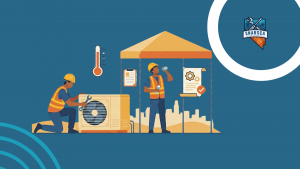Are you looking forward to starting a career in HVAC? You are on the right track, as the HVAC industry is growing rapidly with an increasing demand for heating, cooling, and ventilation systems. Due to this, HVAC technicians are in very high demand today as they keep indoor areas comfy and safe.
Now, you might be wondering how to go ahead and get HVAC education. To explore your options, check out our HVAC education and training programs designed to help you start strong in the industry.
However, broadly, you have two options: an HVAC trade school and a technical college. Both ways come with their own pros and cons and can offer you varying job opportunities in the field of HVAC. Today, in this blog post, let’s learn more about these two career paths and find the most suitable one for you, considering your unique goals, schedule, and budget.
Understanding HVAC Education Paths
A technical HVAC school gives hands-on training and equips the students with job-ready skills. Generally, the programs offered by schools are shorter, as they are designed in such a way that you get a job quickly. If you opt for HVAC schooling, most of your time will go towards understanding how to install, repair, and maintain HVAC systems with the help of real tools and equipment.
On the other hand, college programs are comparatively longer. Like schools, they also offer general education courses. But what sets them apart is the additional HVAC training provided to the students. Additionally, you also get an associate degree when you prefer to enroll in a college HVAC course.
Differences Between an HVAC Trade School and College
Now, let’s move ahead and understand the core differences between an HVAC school and a college program:
Duration of Courses
Are you thinking about how long is HVAC trade school? The answer is: 6 months to 1 year. By choosing a schooling course, you can get trained and start working officially faster.
Conversely, a college dedicated to offering HVAC programs generally takes around 2 years. It’s a kind of longer commitment where you learn from the very basics and reach the advanced level gradually.
Cost of Education
In terms of fees, it is obvious that HVAC training schools are more affordable because they are of shorter duration. On the other hand, college courses require higher tuition charges.
Curriculum Focus: Hands-On Training vs. Theory
If you go to a school offering HVAC training, you will receive hands-on learning via practical knowledge. However, a college course will make you spend more time on theory, which would ultimately help you think about long-term roles in HVAC design and management.
Licensing and Certifications
Both HVAC career paths help you prepare for more or less the same required certifications, including EPA 608 and other key HVACR certifications. The sole aim is to offer you the practical skills and credentials hiring managers are looking for.
Career Outcomes and Opportunities after HVAC Training
Irrespective of the HVAC careers you choose, there are really solid opportunities in the industry waiting for you. As this space is reaching heights of success every day, the requirements for skilled HVAC technicians are increasing. Let’s understand how an HVAC training school and a college course help to grab these job opportunities.
An HVAC trade school offers speedy access to jobs. How? By offering practical knowledge needed to excel in this field in a shorter span. And nowadays, employers are searching for candidates with hands-on skills that trade school grads build from day one.
Now, let’s talk about a college HVAC course. Once you complete it and get a qualified degree, you can get into planning, supervision, and system design-related roles. Although it takes a little longer to get into the field, the broader education offered by top colleges gives you an in-depth understanding of the concepts.
So overall, both HVAC career paths can bring well-paying jobs to you. You are only required to stay dedicated to learning and making things happen practically. Once you do this, the whole HVAC industry is all yours, offering steady career options to learn, advance, and succeed.
Advantages and Disadvantages of HVAC School and College
As you have understood the most important aspects of enrolling in a school and a college to learn about HVAC, let’s have a look at their individual pros and cons below.
Pros of HVAC Trade School
- Quick Job Access: With just 6-12 months of practical knowledge, you can start working and earning sooner.
- Hands-On Training: An HVAC school focuses on building practical skills for the students, such as system installation, maintenance, and diagnostics. They teach you exactly what you would be required to perform at a job in the end.
- Lower Fees: As the school courses are shorter, they are typically more affordable as compared to college programs.
- High Demand from Employers: As the HVAC field is growing day by day, many hiring managers look for practical experience and certifications that trade schools offer.
Cons of HVAC Training School
- Limited Academic Learning: A school focuses primarily on providing practical HVAC knowledge; it lacks emphasis on theory, business skills, or communication.
- Fewer Advancement Pathways: As HVAC trade schools do not offer a proper degree, it may take longer to move into higher-level roles until you gain extra experience or training over time.
Pros of HVAC College
- Broader Educational Foundation: A college provides you with both general knowledge and HVAC-specific training. Ultimately, it will help you grow ahead in the future with your supervision and business ownership roles.
- Opportunities for Academic Growth: If you plan to pursue a bachelor’s degree or shift into engineering, project management, or training, an associate degree from a reputable university can help you.
- Long-Term Career Flexibility: As you develop both technical and academic skills, a lot of job opportunities open up for you. You can opt for both basic-level and supervision roles.
Cons of HVAC College
- Longer Time Commitment: Most of the college courses are of a maximum of 2 years’ duration. This delays your entry into the practical world to pursue a job.
- Higher Overall Cost: To study HVAC systems in college, you need to spend more. The other miscellaneous expenses include books and additional fees.
- Less Immediate Job Focus: Many college programs do not provide a lot of practical training, which might hinder your readiness for field work.
Which Path Is Right For You?
What have you decided now? Are you planning to go to the HVAC technical schools near me or opt for a college degree? To make your decision easier, let us help you out! First of all, you need to consider a few crucial factors: time, finances, learning style preferences, and career goals. Let’s understand each one of them below in detail.
Time Available to Commit
How much time can you invest in learning? If you have ample time, go for a college degree where you will get both general education and practical work. On the other hand, if you are on the lookout for a job quickly, going to an HVAC training school would be the best option.
Budget and Financial Flexibility
If you have financial constraints, you can opt for a schooling program. They are shorter and do not charge a hefty tuition fee. Conversely, if you can afford to invest in your HVAC education, a college would offer a broader education. Ultimately, it will help you in specialized roles later on and cover all your paid charges when you get a well-paying job opportunity.
Learning Style Preferences
Do you want to learn more about HVAC systems practically? Then, an HVAC school is the most suitable option. However, if you want to go for a combination of theory, general education, and HVAC training, a well-rounded college would offer you the best academic experience.
Career Goals
One of the most important aspects to consider is what you need to do in this industry in the long term. Do you want to just get a job as soon as possible and start earning? Go for HVAC technical schools near me. But if you also want to grow communication, leadership, and business skills, a college course would offer you extracurricular activities.
Conclusion
Overall, both HVAC career paths open up the roads to new job opportunities in the industry. If you choose to step into a schooling course, you would come out finishing it earlier with proper practical knowledge of HVAC systems at a lower tuition fee. On the other hand, a college course would offer you a lot extra; you would gain general HVAC knowledge plus training and skills to apply for higher roles of supervision as well.


